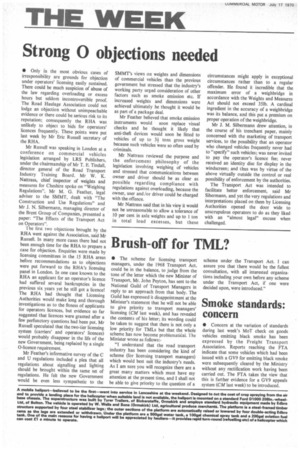Strong 0 objections needed
Page 20

If you've noticed an error in this article please click here to report it so we can fix it.
• Only in the most obvious cases of irresponsibility are grounds for objection under operators' licensing easily sustained. There could be much suspicion of abuse of
the law regarding overloading or excess hours but seldom incontrovertible proof.
The Road Haulage Association could not lodge an objection without unimpeachable evidence or there could be serious risk to its reputation; consequently the RHA was unlikely to object to bids for operators' licences frequently. These points were put last week by Mr Eric Russell secretary of the RHA.
Mr Russell was speaking in London at a conference on commercial vehicles legislation arranged by LRS Publishers, under the chairmanship of Mr T. E. Tindall, director general of the Road Transport Industry Training Board. Mr W. K.
Nattrass, chief inspector of weights and measures for Cheshire spoke on "Weighing Regulations". Mr M. G. Feather, legal adviser to the SMMT, dealt with "The Construction and Use Regulations" and Mr J. N. Silberrnann, managing director of the Brent Group of Companies, presented a paper: "The Effects of the Transport Act on Operators".
The first two objections brought by the RHA went against the Association, said Mr Russell. In many more cases there had not been enough time for the RHA to prepare a case for objection. Enquiries were made by licensing committees in the 15 RHA areas before recommendations as to objections were put forward to the RHA's licensing panel in London. In one case known to the RHA an applicant for an operator's licence had suffered several bankruptcies in the previous six years yet he still got a licence! The RHA had thought that Licensing Authorities would make long and thorough investigations as to the fitness of applicants for operators lice nces, but evidence so far suggested that licences were granted after a few perfunctory questions had been put. Mr Russell speculated that the two-tier licensing system (carriers' and operators' licences) would probably disappear in the life of the new Government, being replaced by a single 0-licence requirement.
Mr Feather's informative survey of the C and U regulations included a plea that all regulations about signalling and lighting should be brought within the same set of regulations. He felt the new Government would be even less sympathetic to the SMMT's views on weights and dimensions of commercial vehicles than the previous government but stressed that the industry's working party urged consideration of other factors such as smoke emission etc. If increased weights and dimensions were achieved ultimately he thought it would be as part of a package deal.
Mr Feather believed that smoke emission instruments would soon replace visual checks and he thought it likely that anti-theft devices would soon be fitted to vehicles of up to 3-1tons gross weight because such vehicles were so often used by criminals.
Mr Nattrass reviewed the purpose and the enforcement philosophy of the legislation involving weighing of vehicles and stressed that communications between owner and driver should be as clear as possible regarding compliance with regulations against overloading, because the owner, user and/or driver could be charged with the offence.
Mr Nattrass said that in his view it would not be unreasonable to allow a tolerance of 10 per cent in axle weights and up to 1 ton in total load excesses, but these
circumstances might apply in exceptional circumstances rather than to a regular offender. He found it incredible that the maximum error of a weighbridge in accordance with the Weights and Measures Act should not exceed 351b. A cardinal ingredient in the accuracy of a weighbridge was its balance, and this put a premium on proper operation of the weighbridge.
Mr J. M. Silberrnann drew attention, in the course of his trenchant paper, mainly concerned with the marketing of transport services, to the possibility that an operator who changed vehicles frequently never had to "specify" such vehicles; was never invited to pay the operator's licence fee; never received an identity disc for display in the windscreen; and thus was by virtue of the above virtually outside the control or real possibility of enforcement by the authorities.
The Transport Act was intended to facilitate better enforcement, said Mr Sibermann, and yet the very regulations and interpretations placed on them by Licensing Authorities opened the door wide to unscrupulous operators to do as they liked with an "almost legal" excuse when challenged.








































































































